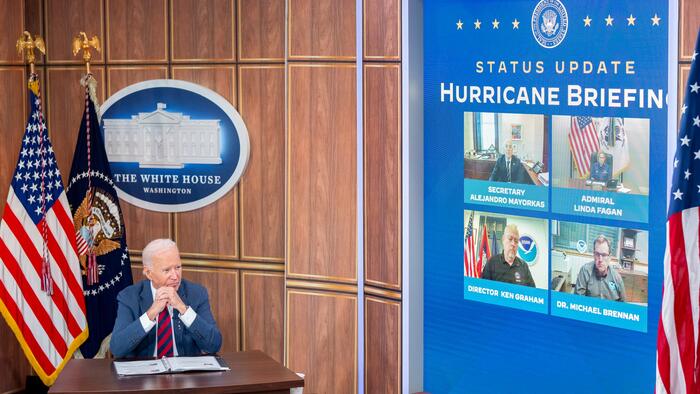On a recent Thursday, President Joe Biden’s White House briefing regarding Hurricane Milton revealed both the gravity of the situation and the unsettling nature of his responses. As he addressed the emergency response and federal aid in Florida, Biden made headlines for his unusual remarks when pressed on a conversation he had with Israeli Prime Minister Benjamin Netanyahu. In a notably disjointed moment, Biden stated that Netanyahu was “coming over to help with the storm,” a comment that many media outlets attempted to downplay as humor. However, this response raised more eyebrows than it garnered laughter, highlighting growing concerns about Biden’s cognitive fitness as the nation grapples with crises both domestically and overseas. The situation is particularly pressing as tensions escalate in the Middle East, where the threat of war looms large.
The backdrop of the presidency’s bizarre moments includes heightened scrutiny from both allies and opponents regarding Biden’s leadership capabilities. In recent months, there have been whispers among Democrats questioning his fitness to lead, especially given the precarious global climate involving nuclear threats from Russia and unrest in the Middle East. Just a day before Biden’s briefing, he had reportedly engaged in a direct 30-minute conversation with Netanyahu. The looming conflict in the region, involving Iran and Israel, necessitates robust and reliable leadership, raising alarms when the president’s public comments appear disorganized and confusing.
War is not the only concern Biden faces; domestic challenges also escalate amidst natural disasters. While speaking about Hurricane Milton, he chastised former President Donald Trump for being nonchalant, telling him to “get a life, man,” and encouraging him to lend a hand to those affected. This admonishment comes across not just as an awkward exchange but as a notable shift in Biden’s tone towards a former president customarily regarded with political decorum, particularly during times of crisis. For a president knee-deep in disaster response, diverting focus to Trump raises questions about priorities and the styles of governance in a tense period.
Adding complexity to his communication, Biden’s peculiar remarks hint at a broader issue that the administration needs to address: public perception of leadership reliability. As Hurricane Milton wreaked havoc at home and U.S. troops faced risks abroad, many observers suggested that Biden appeared less prepared than required for such multifaceted challenges. Some commentators assert that there seems to be a lack of clear direction within the White House, questioning who is really steering the ship in these tumultuous times. Such perceptions can significantly affect both domestic confidence and international relationships during crises.
The implications of Biden’s remarks extend beyond mere political gaffes or media interpretation. They stir skepticism when the nation demands strong, decisive leadership in handling emergencies—whether natural disasters or geopolitical tensions. As the situation unfolds, the unfortunate juxtaposition of a struggling domestic agenda with international turmoil places immense pressure on the Biden administration. Observers are attuned to his every word, channeling both national hope and skepticism about his ability to manage crises effectively.
In this increasingly complex political landscape, Biden’s presidency finds itself at a crucial juncture. The interplay of domestic disasters, international conflicts, and public perceptions of leadership capabilities inevitably shapes the discourse moving forward. As both historical events and current disasters surround him, the capacity to maintain an authoritative and coherent presence becomes paramount. Whether Biden can recalibrate after such bewildering moments remains to be seen, and it will significantly influence how his administration navigates the political waters ahead.

